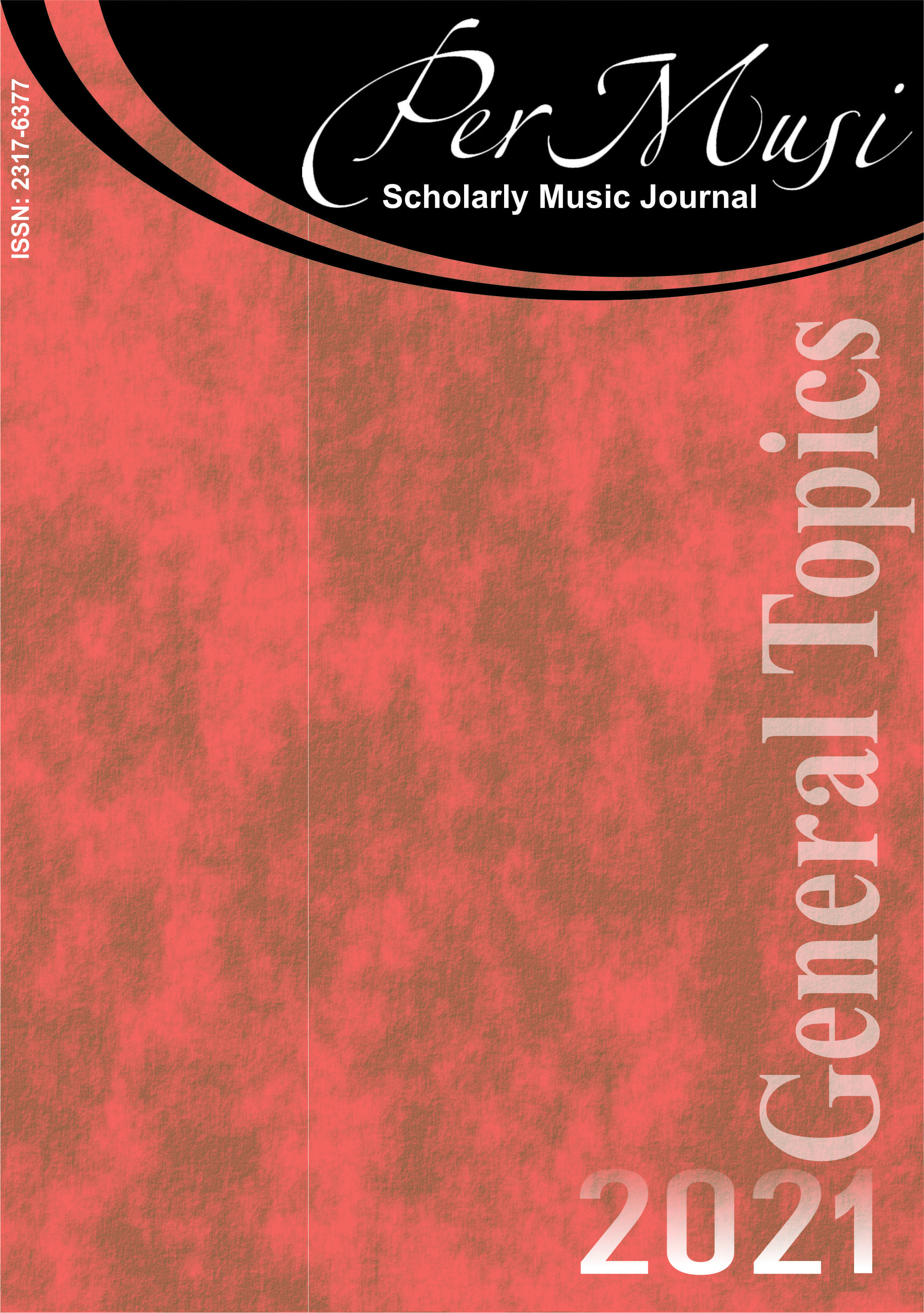Desenvolvimento da performance e ensino crossover de canto
entrevista com a cantora e atriz Bianca Tadini
DOI:
https://doi.org/10.35699/2317-6377.2021.36194Palavras-chave:
Canto crossover, Ópera, Teatro musical, Técnica vocal híbrida, Pedagogia vocalResumo
A presente entrevista realizada com a atriz e cantora crossover, Bianca Tadini, revela aspectos acerca de seus métodos pessoais de estudo, aprendizado e ensino, utilizados com o propósito de cantar repertórios que exigem consideráveis diferenças de produção vocal, sem, entretanto, reminiscências entre um estilo e outro. As questões priorizam posturas tomadas frente às situações em que a demanda exigida pelo trabalho era de alternância entre os gêneros Ópera e Teatro Musical. A entrevistada relata quais, a seu ver, foram os elementos facilitadores de seu aprendizado e, ainda, quais costuma utilizar tanto em seu estudo e manutenção de técnica vocal quanto em sua abordagem pedagógica.
Referências
Benz S., Sellaro R., Hommel B., and Colzato LS. 2016. “Music Makes the World Go Round: The Impact of Musical Training on Non-musical Cognitive Functions—A Review”. In Frontiers in Psychology (6): 2023. doi: 10.3389/fpsyg.2015.02023.
Bogdan, R., e Biklen, S. (2010). Investigação Qualitativa em Educação: Uma Introdução à Teoria e aos Métodos. Porto: Porto Editora.
Colognese, Silvio A., e Melo, José Luiz D. 1998. “A Técnica de Entrevista na Pesquisa Social.” In Cadernos de Sociologia (9): 143 - 159.
Elliot, M. 2006. Singing in Style: A Guide to Vocal Performance Practices. Yale University Press.
Fach. 2002. In Grove Music Online. <https://www.oxfordmusiconline.com/grovemusic/search?q=Fach&searchBtn=Search&isQuickSearch=true>.
Hines, Jerome. 2006. Great Singers on Great Singing. Limelight Editions, Amadeus Press, New Jersey.
Kuhl, P. K. 2011. “Early Language Learning and Literacy: Neuroscience Implications for Education”. In Mind, Brain, and Education, 5(3): 128–142. doi.org/10.1111/j.1751-228X.2011.01121.x.
Leborgne, Wendy D., and Rosemberg, Marci D. 2014. The Vocal Athlete. San Diego: Plural Publishing.
Oliveira, Rafael. 2016. “Os microfones e a Broadway”. In Musical em bom Português. https://sites.google.com/site/musicalembomportuguesintro2/material-teorico/artigos-sobre-teatro-musical/45-os-microfones-e-a-broadway
Physique du Rôle. 2021. Michaelis, Dicionário Online de Português. Editora Melhoramentos Ltda. https://michaelis.uol.com.br/busca?id=OKyLa.
Roll, Christianne. 2016. “The Evolution of the Female Broadway Belt Voice: Implications for Teachers and Singers”. In Journal of Voice 30 (5).
Rubim, Mirna. 2019. Voz Corpo Equilíbrio. Rio de Janeiro: Thieme Revinter.
Schulze, Katrin, and Koelsch, Stephan. 2012. “Working memory for speech and music: Schulze & Koelsch. In Annals of the New York Academy of Sciences 1252 (1): 229–236.
Spivey, Norman, and Barton, Mary. 2018. Cross-Training in the Voice Studio: A Balancing Act. San Diego: Plural Publishing.
Sundberg, J., Gramming, P., and Lovetri, J. 1993. “Comparisons of Pharynx, Source, Formant, and Pressure Characteristics in Operatic and Musical Theatre Singing,” In Journal of Voice 7 (4): 301–310.
Sundberg, J., & Thalén, M., & Popeil, L. 2012. “Substyles of Belting: Phonatory and Resonatory Characteristics”. In Journal of Voice 26 (1): 44–50.
Titze, I., Worley, A. S., and Story, B. H. 2011. Source-Vocal Tract Interaction in Female Operatic Singing and Theater Belting. In Journal of Singing 67 (5): 561-572.
Yamaguchi, Vitor, e Bortz, Graziela. 2021. “Memória operacional em música: Principais marcos teóricos e alguns dos desafios em seu estudo”. In Musica Hodie 21, e67358.
Publicado
Edição
Seção
Licença
Copyright (c) 2021 Per Musi

Este trabalho está licenciado sob uma licença Creative Commons Attribution 4.0 International License.

Exceto onde está indicado, o conteúdo neste site está sob uma Licença Creative Commons - Atribuição 4.0 Internacional.












